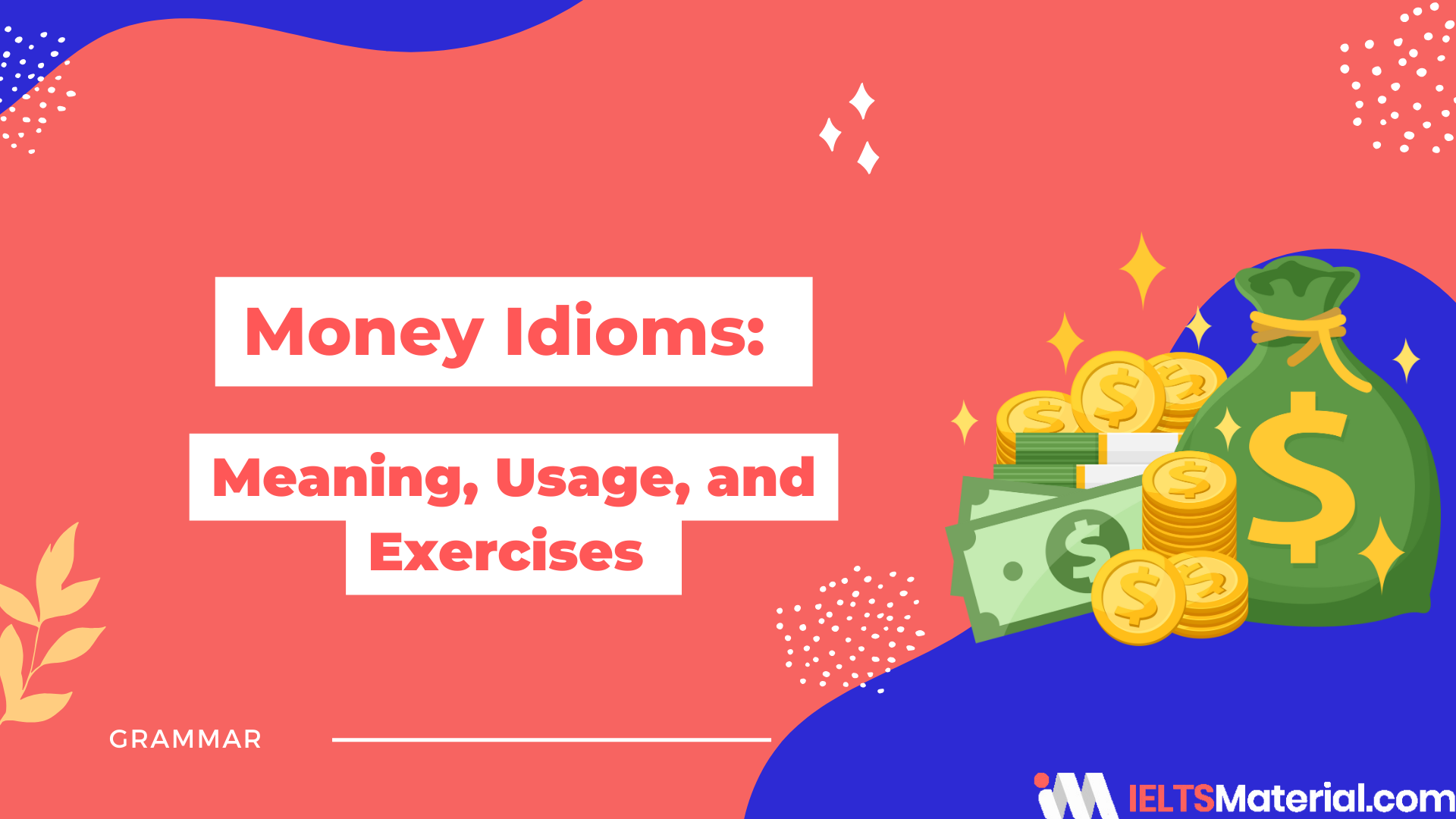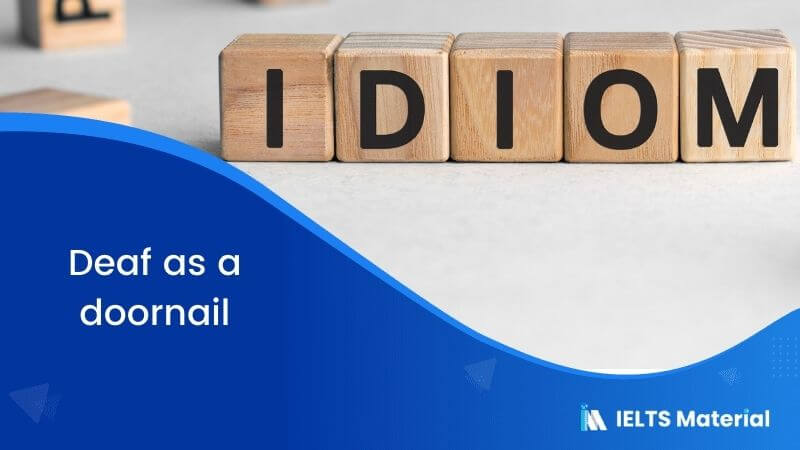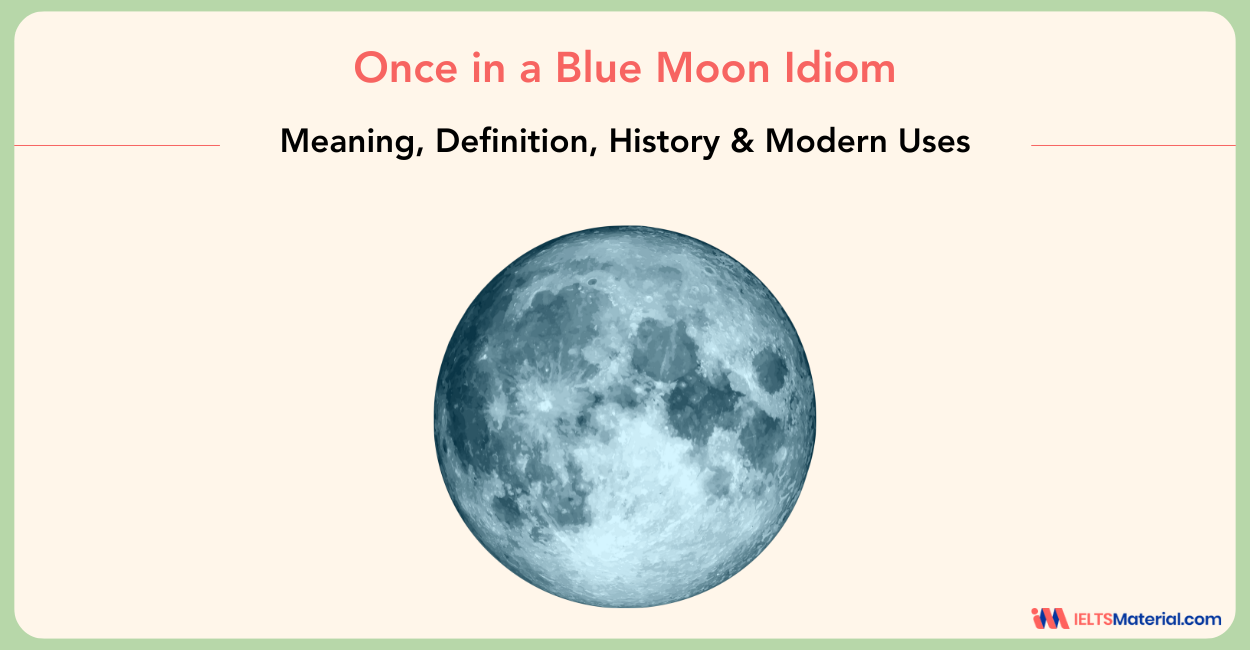Money Idioms: Meaning, Usage, and Exercise!
Table of Contents

Limited-Time Offer : Access a FREE 10-Day IELTS Study Plan!
When preparing for the IELTS, mastering idiomatic expressions can significantly enhance your language skills and overall score. Idioms are a vital part of English language proficiency, and incorporating them into your vocabulary can make your communication more effective and natural.
In this blog, we will explore a variety of common money idioms that will not only enrich your language but also elevate your IELTS score.
20 Most Famous Idioms Based Around ‘Money’
Learn the most acknowledged money idioms that are used worldwide as a part of the general speech. Here’s the list of money idioms with meanings:
- Break the bank: To spend a lot of money, often more than you can afford.
Eg. Sarah’s decision to buy the latest designer handbag almost broke the bank.
- Penny pincher: Someone who is extremely frugal and reluctant to spend money.
Eg. Even though Mark earns a good salary, he’s known for being a penny pincher and rarely splurges.
- Cash cow: A reliable source of continuous income or profits.
Eg. The online course became a cash cow for the company, bringing in consistent revenue.
- Cost an arm and a leg: Something that is very expensive.
Eg. The tickets to the concert cost an arm and a leg, but the experience was worth it.
- Make ends meet: To have enough money to cover basic expenses.
Eg. Despite her modest income, Maria manages to make ends meet by budgeting wisely.
- Tighten one’s belt: To reduce spending due to financial difficulties.
Eg. After the unexpected medical expenses, the family had to tighten their belt to manage finances.
- Money talks: The idea that money can influence and motivate people.
Eg. The allure of a high-paying job can often make money talk louder than other considerations.
- Burn a hole in one’s pocket: To have money that you’re eager to spend.
Eg. After receiving her bonus, Emily felt like there was money burning a hole in her pocket.
- Go Dutch: To split the bill equally in a group setting.
Eg. When we went out for dinner, we decided to go Dutch, and each paid for our own meal.
- In the red: To be in debt or owe money.
Eg. Due to excessive spending, the company found itself in the red at the end of the fiscal year.
- Live within one’s means: To spend only what you can afford.
Eg. Despite her desire for luxury, Sarah prefers to live within her means and save for the future.
- Rolling in dough: To be very wealthy.
Eg. The tech entrepreneur became wealthy through his innovative ideas and is now rolling in dough.
- A dime a dozen: Something that is common and easy to find.
Eg. In the city, coffee shops are a dime a dozen, so choosing the best one is a challenge.
- Born with a silver spoon in one’s mouth: Born into a wealthy family.
Eg. Being born with a silver spoon in his mouth, James had access to all the privileges of wealth.
- Money doesn’t grow on trees: Money is not unlimited and should be spent wisely.
Eg. As a parent, I often remind my children that money doesn’t grow on trees, so they should spend wisely.
- Hit the jackpot: To achieve great success or make a lot of money suddenly.
Eg. Sarah hit the jackpot when her startup idea gained immense popularity and attracted investors.
- Rob Peter to pay Paul: To take from one source to cover another debt.
Eg. John had to rob Peter to pay Paul, taking a loan to cover his existing debt.
- Feather one’s nest: To save money for the future.
Eg. With careful investments, Lisa managed to feather her nest and secure her retirement.
- Money to burn: Having more money than you need.
Eg. After winning the lottery, Mike suddenly had money to burn and indulged in luxurious vacations.
- Throw money down the drain: To waste money on something unnecessary.
Eg. Buying an expensive gym membership and never using it is like throwing money down the drain.
Master idioms and ace your IELTS exam with our Vocabulary and grammar book!
Changes in Usage
Humans evolve over time so does the way things are interpreted. The meaning of the money idioms also changed and now with a certain alteration people use it differently. Here’s a table highlighting the changes in the usage of these money idioms:
| Idiom | Original Meaning | Altered Usage |
| Break the bank | To bankrupt oneself | To spend a lot excessively |
| Penny pincher | Someone who hoards pennies | An overly frugal individual |
| Cash cow | A sacred cow in India | A reliable income source |
| Cost an arm and a leg | Sacrificing limbs for a cost | Something very expensive |
| Make ends meet | Literally joining ends | To manage basic expenses |
| Tighten one’s belt | Literally tightening a belt | Cutting back on spending |
| Money talks | Money as a form of speech | Money’s persuasive influence |
| Burn a hole in the pocket | Literal burning of a pocket | Eagerness to spend available money |
| Go Dutch | Associating with the Dutch | Splitting a bill evenly in a group |
| In the red | Literally colored in red | Being in debt or owing money |
| Live within means | Living inside a physical means | Spending within one’s financial capabilities |
| Rolling in dough | Literally rolling in dough | Being very wealthy |
| A dime a dozen | Literally ten for a dozen | Something common and easily found |
| Born with a silver spoon | Literally born with a spoon | Born into a wealthy family |
| Money doesn’t grow on trees | Literal growth on trees | Money is not unlimited and should be spent wisely |
| Hit the jackpot | Hitting a literal jackpot | Sudden great success or making money |
| Rob Peter to pay Paul | Taking from Peter and paying Paul | Robbing one source to pay another |
| Feather one’s nest | Literally adding feathers | Saving money for the future |
| Money to burn | Money meant for burning | Having excess money |
| Throw money down the drain | Literally throwing money | Wasting money on unnecessary things |
Practice Exercise
Instruction: Apply your newfound knowledge with this exercise. Match the money idioms with their appropriate situations.
- Sam’s extravagance always amazes me. He seems to __________________ with his lavish spending.
- Despite the economic downturn, Sarah manages to __________________ by working two part-time jobs.
- After winning the lottery, Jenny felt like she had __________________.
- The new smartphone model __________________, but I think it’s too expensive for its features.
- Lisa’s uncle is a successful entrepreneur, and he’s truly __________________.
- Jack lost his job and had to __________________, cutting back on non-essential expenses.
- Emma wants to buy a car, but she’ll have to __________________ to save up enough money.
- In today’s world, __________________ – it influences decisions and opens doors.
- We decided to __________________ at the restaurant last night and split the bill equally.
- Alex always avoids going out to eat. He’s such a __________________.
Answer Key
- Burn a hole in his pocket
- Make ends meet
- Hit the jackpot
- Cost an arm and a leg
- Rolling in dough
- Tighten his belt
- Feather her nest
- Money talks
- Go Dutch
- Penny pincher
Conclusion
By incorporating these money idioms into your vocabulary, you’ll not only sound more fluent but also impress the IELTS examiners with your grasp of natural English expressions. Regular practice, coupled with real-world application, will help you integrate these idioms seamlessly into your speech and writing, ultimately boosting your IELTS score and advancing your language skills. So, go ahead, start using these idiomatic expressions, and watch your language proficiency reach new heights!
Enroll in our Master Program and improve your proficiency in using idioms and phrases!
Explore IELTS Resources

Start Preparing for IELTS: Get Your 10-Day Study Plan Today!












Post your Comments